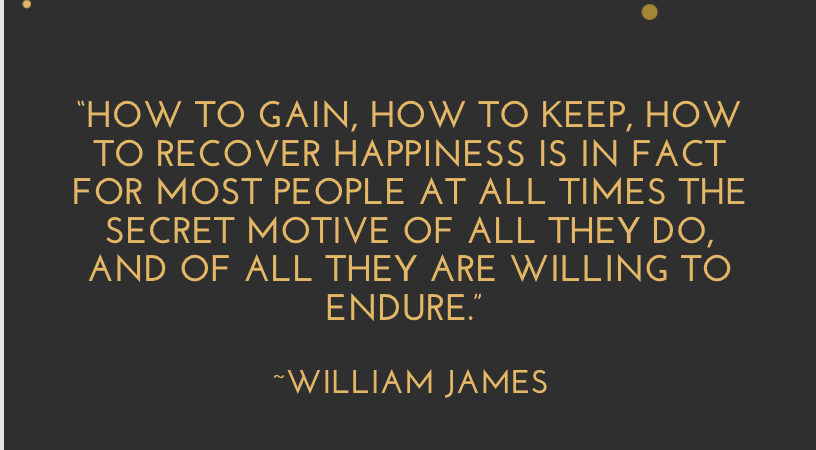|
Striving to be happy and fulfilled is not just something that has been focused on in the literature in the last 100 years. The study of happiness and well-being dates back as far as 300 B.C.
Aristotle was one of the first philosophers who was deeply engaged in the process of contemplating what the good life meant and how it revealed itself in multiple different forms in the human experience. The term 'Eudaimonia' was the Greek word used to describe the state of condition of the ‘good spirit'. In its simplest form, the word eudaimonia was often taken to mean happiness. Projecting forward to modern times, for the good spirit to be experienced with consistency, certain conditions must be met if human flourishing is to be realized and experienced in a person’s life. According the the work of well-known researchers, Deci and Ryan (Self-Determination Theory): "Well-being is not so much an outcome or end state as it is a process of fulfilling or realizing one’s daimon or true nature—that is, of fulfilling one’s virtuous potentials and living as one was inherently intended to live." Prior to the 90's, traditional psychology, for the most part, had always focused on what wasn’t working with humans. Enter Dr. Martin Seligman on the scene. He was one of the first clinical psychologists to get fed up with the field of psychology focusing on the misery of the human condition. Therefore, he took it upon himself to challenge the predominant way of thinking in his field. Throughout the second half of his career, he ended up flipping the traditional paradigm of psychology on its head by developing the Positive Psychology movement. Since the inception of this framework in 1998, the Positive Psychology movement has focused on studying well-being instead of unhappiness, accomplishment instead of failure, and strength instead of sickness. Seligman’s hope was that psychology could become less fixated on neuroses, less dependent on medication and, altogether, a much more useful approach to life. To this end, Seligman and his team created the PERMA model which represents, what they believe to be, the five core elements of happiness and well-being. Here is what each letter of the acronym stands for: P-Positive Emotions E- Engagement R- Relationships M- Meaning A-Accomplishments The PERMA model can be used as an excellent reflective tool for all people to assess, to what degree, they are experiencing well-being and flourishing in their own life. The PERMA model can be a great starting point to address a person's levels of well-being and flourishing in order to focus on the actionable steps needed to live with more fulfillment. Bearing this in mind, how might you rank yourself on a scale of 1-10 based on the questions below? (1 means extremely low, 10 means extremely high)
Your 1-10 rating for each question above should provide you with some initial data to reflect on. If you ranked yourself lower in any of these areas, it is OK as most people do. This process is not about self-judgement but more so about curiosity. To take it one step further, you can reflect more deeply on the following: P- What 20-25% of experiences bring you most of your positive emotions? E- What 2-3 activities in your life bring you the deepest flow states? R- What 20-25% of the relationships in your life bring you most fulfillment? M- What activities allow you to feel as though you are truly contributing to something larger than yourself? A- What 2-3 accomplishments could bring you maximum satisfaction over the next few months or upcoming year? And finally, after answering the above questions, you can use the PERMA model to begin to zero in on what you need to do more of or less of to create more fulfillment in your life. Try doing both steps above to see what you come up with and how it might get you to reflect differently on your life. Happy to chat with anyone wanting to dig deeper into the themes or ideas that are revealed to you through this process. *Special note* This is purely a thought activity. It's not meant to be a cure for any diagnosed mental illness. Instead, it is a reflective tool to initiate thought about what is possible in your life. Comment below for a follow up discussion with me. Thanks for reading.
4 Comments
Jamie House
5/22/2022 04:19:02 am
Thanks for sharing the PERMA model. I wonder if might think of an anti-PERMA model that prompts to think about behaviors or patterns we subconsciously engage in that could fall under the criteria but does so in a malignant way.
Reply
yara janeb
6/2/2022 08:41:13 am
this one was really helpful as a reflection , I use it as a tool in a meeting at work , and gave us a new perspective and thoughts \ ideas to think\RE-think about.
Reply
Leave a Reply. |
AuthorKAUST Faculty, Pedagogical Coach. Presenter & Workshop Leader.IB Educator. #RunYourLife podcast host. Archives
September 2022
|
- Welcome
- All Things Teaching and Learning
- The Aligned Leader Blog
- Consulting and Coaching Opportunities
- My TED X Talk
- My Leadership Blog
- Run Your Life Podcast Series
- How PYP PE with Andy Has Helped Others
- Good Teaching is L.I.F.E
- The Sportfolio
- Example Assessment Tasks
- PYP Attitude Posters (printable)
- Publications

 RSS Feed
RSS Feed
